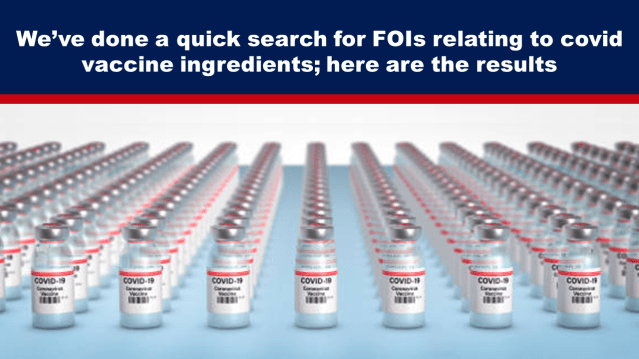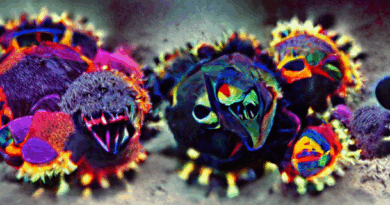We’ve done a quick search for FOIs relating to covid vaccine ingredients; here are the results
In the UK, we have the right to request information from any public body and get answers. WhatDoTheyKnow is a non-governmental website that helps us make a Freedom of Information (“FoI”) request and publishes all the requests and responses online.
We were curious to know if our public health bodies were testing samples of batches of covid vaccines administered in the UK to ensure the ingredients were as they have publicly declared. So, we conducted a quick search.
A simple search for ““vaccine batches”” on WhatDoTheyKnow, returns 50 results with some FoIs sent to multiple institutions. To view a list of these 50 FoIs the search words entered into the website’s search box are enclosed in double quotation marks (e.g., “search term”) to refine the search.
A search for “vaccine batches” not enclosed in quotation marks returns 200 results, although this will include results for both of the single words “vaccine” and “batches” as well. The word “batches” could be used to describe almost anything so many of the results will be unrelated to vaccines, let alone covid vaccines.
Below is a list of the FoIs relating to covid vaccine ingredients selected from the first two pages of results using the search term “vaccine batches” (without quotation marks). We’ve reordered the FoIs so that they are listed in ascending date order.
Some of the FoIs are lengthy, so we have shown little more than a brief one-line extract from each. A hyperlink to the specific FoI is contained in the institution’s name.
In our list, for each of the FoIs, we begin with the title of the FoI followed by the date the request was made, the institution the request was made to, what the request asked (in italics), the response and the status (in bold type). Please note the status of the request is completed by the requestor and not the institution the information is being requested from.
The Medicines and Healthcare products Regulatory Agency (“MHRA”) is the regulator of medicines, medical devices and blood components for transfusion in the UK. “We rigorously use science and data to inform our decisions, enable medical innovation and to make sure that medicines and healthcare products available in the UK are safe and effective,” MHRA states.
One of its responsibilities is to “educate the public and healthcare professionals about the risks and benefits of medicines, medical devices and blood components, leading to safer and more effective use.”
A number of the 16 FoIs below were requests made to the MHRA. Even though this is merely a quick overview, MHRA’s responses, or lack thereof, are quite revealing and indicate they do not “rigorously use science and data” to ensure healthcare products available in the UK are safe and effective. If they are not rigorously using science and data, how are they able to educate the public and healthcare professionals about the risks and benefits of products that fall under their responsibility?
Let’s not lose touch…Your Government and Big Tech are actively trying to censor the information reported by The Exposé to serve their own needs. Subscribe now to make sure you receive the latest uncensored news in your inbox…
1. Percentage of Placebo’s in Vaccine Rollout, 18 April 2021, Public Health Scotland
Can you confirm if, and how many placebo vaccines, by percentage or ratio, have been administered to the public in the vaccine rollout for Scotland?
Public Health Scotland does not hold the information outlined in your request.
Placebo vaccines have not been administered as part of the vaccine rollout programme in Scotland and are only administered as part of consented clinical trials. Furthermore, Public Health Scotland has not been directly involved in clinical trials for either the Astra Zeneca or Pfizer vaccinations.
Successful
2. Covid vaccines and saline, 19 April 2021 and 21 April 2021, NHS England and Public Health Scotland
How many of the batches contained saline, and how many doses of saline on average per batch?
NHS England: There are no “doses” of saline – it is contained, in a small amount, within each vaccine.
Public Health Scotland: Public Health Scotland does not hold the information outlined in your request.
Partially successful and Awaiting classification
3. Which medicines that are currently being used in England, contain graphene oxide or derivatives of graphene oxide, 5 October 2021, Medicines and Healthcare Products Regulatory Agency
Which medicines that are currently being used in England, contain graphene oxide or derivatives of graphene oxide?
And please specify if any of the ingredients of any medicines are not published due to trade secrets.
Do you obtain independent laboratory reports to confirm the ingredients or do you rely on the drug manufacturer?
Please let me have a copy of the independent laboratory reports detailing the analysis of the ingredients of the Pfizer, Moderna, AstraZeneca, and Johnson & Johnson Covid-19 “vaccines.”
No licensed medicines or those under emergency use in England contain graphene.
All excipients are published.
No licensed medicines or medicines under emergency use authorisation in England contain either graphene oxide or derivatives of graphene oxide.
There are no “trade secret” ingredients which are not published.
All vaccines authorised and deployed in the UK have been subject to rigorous checks by the MHRA, including individual batch testing and site inspections, even where those sites are outside the UK.
Regarding your request for the independent laboratory reports detailing the analysis of the ingredients of the Pfizer, Moderna, AstraZeneca, and Johnson & Johnson Covid-19 vaccines, MHRA neither confirms nor denies that it holds information falling within the description specified in your request.
Information not held (Note: an internal review was requested.)
4. Contaminants in the UK Covid experimental vaccines, 12 January 2022, Medicines and Healthcare Products Regulatory Agency
Can you please clarify if routine independent batch testing of sample vials is invasive (i.e. it involves testing of the actual content of the vials) and, if so, who holds the related images and data, if not you?
We have already responded about visual inspection and it is not an invasive test.
Long overdue
5. Manufacturing tolerances and Quality Assurance of COVID-19 vaccines, 21 February 2022, Medicines and Healthcare Products Regulatory Agency
[Please provide] full manufacturing specifications of the contents of all Covid-19 vaccines licenced by MHRA.
This information would be exempt under Section 41 and Section 43 of the Freedom of Information Act.
Refused (Note: an internal review was requested to no avail.)
6. Analytical methods used in batch testing covid-19 vaccines, 24 March 2022, Medicines and Healthcare Products Regulatory Agency
Does MHRA/NIBSC have access to any of the following analytical methods?
MHRA/NIBSC does have access to some of the analytical methods listed. They are not used in the assessment of COVID-19 vaccines, other than optical microscopy that is used for some potency assays.
Partially successful
7. RNA integrity of experimental modRNA covid-19 drugs (Pfizer and Moderna), 21 June 2022, Medicines and Healthcare Products Regulatory Agency
With respect to Pfizer’s product BNT162b2 (Comirnaty), please supply all results available to the MHRA indicating the RNA integrity of Process 1 batches for clinical supply and the RNA integrity of Process 2 batches for commercial supply.
Regarding the [above] request, the information requested concerns parts of the quality dossier that are commercially sensitive and so would be exempt from release under Section 41 (Information provided in confidence) and Section 43 (Commercial interests).
Refused (Note: an internal review was requested to no avail.)
8. Covid-19, 14 November 2022, Medicines and Healthcare Products Regulatory Agency
What technology is used to test the vial’s contents?
Visual inspection – Performed for COVID vaccines produced by Pfizer/BioNTech, Moderna and AZ.
Successful
9. Recall of Moderna vaccine in Japan, 25 January 2023, Medicines and Healthcare Products Regulatory Agency
Was any independent chemical or physical analysis (including holding a magnet close to the material) performed on the Moderna vaccine performed prior to approval of any marketing authorisation?
Representative samples from all batches of Moderna COVID-19 mRNA vaccine that are deployed in the UK undergo independent laboratory testing at NIBSC prior to their release. These tests include visual inspection and laboratory tests to measure purity, content and identity. Please find more details is the following link: HERE.
Partially successful
10. Vaccine Contents, 20 February 2023, Medicines and Healthcare Products Regulatory Agency
Will you give a fully independent, audited lab analysis of the contents of various Covid-19 vaccines in circulation in the UK?
Can you confirm that ALL UK vaccines for Covid-19 and the current annual flu vaccines DO NOT contain PEG or hydrogel and DO contain biologics as listed and authorised for use?
All batches of licenced Covid vaccines that have been used in the UK vaccination programme have been independently tested under Statutory Rules.
The testing carried out for different vaccines is based on the EU Guidelines for Official Control Authority Batch Release (OCABR) for Human Biologicals: Vaccines, blood and plasma derivatives which can be found on the European Directorate for the Quality of Medicines and Healthcare (EDQM) website. Human OCABR Guidelines – European Directorate for the Quality of Medicines & HealthCare (edqm.eu). Within this link the requirements for testing of influenza vaccines is outlined. Covid vaccines are tested according to the OCABR activities related to COVID-19 vaccines – European Directorate for the Quality of Medicines & HealthCare (edqm.eu).
Successful (Note: as MHRA neither confirmed or denied whether they hold the information requested and have not applied an exemption that would remove this obligation, an internal review was requested to no avail.)
11. Host Cell Protein (HCP) Impurities in COVID-19 Vaccines, 31 March 2023, Medicines and Healthcare Products Regulatory Agency
Please provide the following data concerning host cell protein (HCP) impurities …
Peer-reviewed research from the University of Ulm has characterised 44-71% of total protein content from all 4 AstraZeneca lots tested as being of human origin. Please therefore also disclose any communication between the MHRA and AstraZeneca on human HCPs and any actions taken by the MHRA in response to the study results.
These data are exempt under Sections 41 and 43 of the FOI Act.
Refused (Note: as the response was unsatisfactory an internal review was requested to no avail.)
12. Contaminated modRNA covid-19 Vaccines, 28 July 2023, Medicines and Healthcare Products Regulatory Agency
[Please provide] all documentation is available to the MHRA on batches and vials disposed and/or rejected due to contamination and/or impurities throughout 2023 to date.
We hold the information for all parts of your request apart from “quantification of the contaminants/impurities” [and] “date contaminated batch/vial disposed/rejected,” we do not hold this information.
Partially successful
13. Presence of fragmented DNA and SV40 enhancer found in the Pfizer-BioNTech mRNA vaccine, 9 November 2023, Medicines and Healthcare Products Regulatory Agency
Has the MHRA ever independently tested the Pfizer/BioNTech vaccine at the vial level?
In the context of fragmented DNA and SV40 enhancer MHRA has not tested the Pfizer/BioNTech vaccine at the vial level.
Partially successful
14. Who must test each mRNA COVID-19 batches before they are released if MHRA has not full list of the ingredients? 27 November 2023, Medicines and Healthcare Products Regulatory Agency
Who must test each mRNA covid-19 batch before they are released?
The batches of mRNA COVID-19 vaccines for Pfizer and Moderna are tested by the company before they are released; the batches are then also tested by MHRA (formerly NIBSC, note the website is due to be updated).
Partially successful
15. Genotoxicity of mRNA products, 30 November 2023, Medicines and Healthcare Products Regulatory Agency
Can you categorically confirm that the Pfizer mRNA Covid-19 vaccine in use/past use in the UK does NOT contain the SV40 large T antigen?
Simian vacuolating virus 40 (SV40) is a virus present in monkey kidney cells. We are not aware of any Covid-19 vaccine containing SV40 virus or SV40 antigens. A short sequence of the nucleic acid from the SV40 virus is present in the Pfizer/BioNTech Covid-19 vaccine, but this is not the sequence coding for the SV40 large T antigen (see Figure 1 of ‘BNT162b vaccines protect rhesus macaques from SARS-CoV-2’ : https://www.nature.com/articles/s41586-021-03275-y) and therefore the vaccine cannot direct the synthesis of that antigen.
Successful
16. Did you test the vaccines for SV40 yet? If not when are you going to test mRNA vaccines for SV40 or other contaminants? 2 January 2024, Medicines and Healthcare Products Regulatory Agency
Did you test the vaccines for SV40 yet?
If not, when are you going to test mRNA vaccines for SV40 or other contaminants?
Independent laboratory testing of vaccines is carried out by the MHRA’s Official Medicines Control Laboratory (OMCL) (with a NIBSC certificate being applied to compliant batches). The independent testing does not verify the composition of the vaccine, rather it assesses key parameters that focus on biological quality of the product.
There are currently no intentions to test mRNA vaccines for the presence of SV40 or other contaminants.
Awaiting classification

This article has been archived for your research. The original version from The Exposé can be found here.



